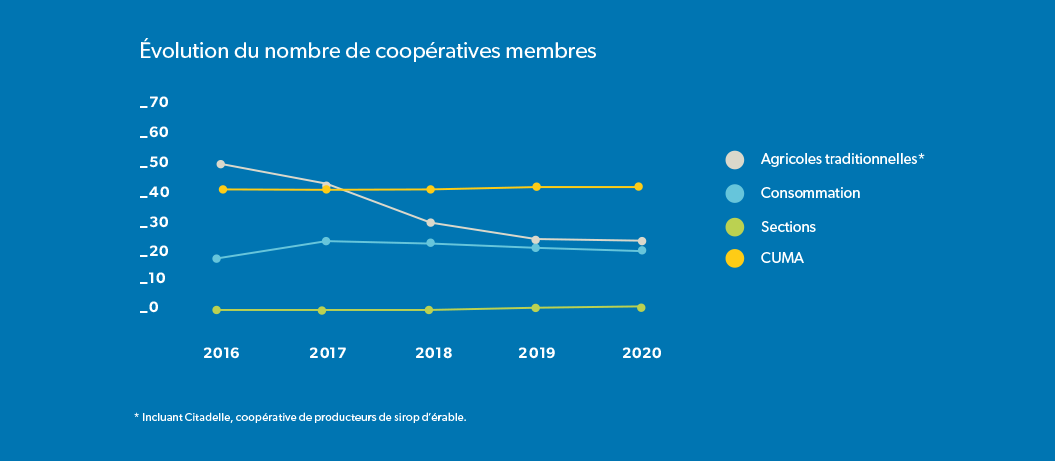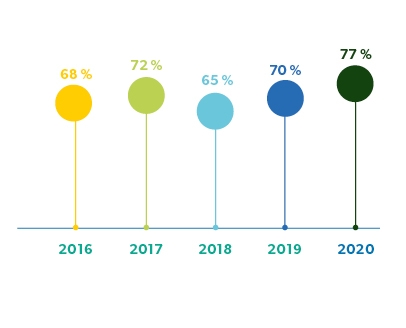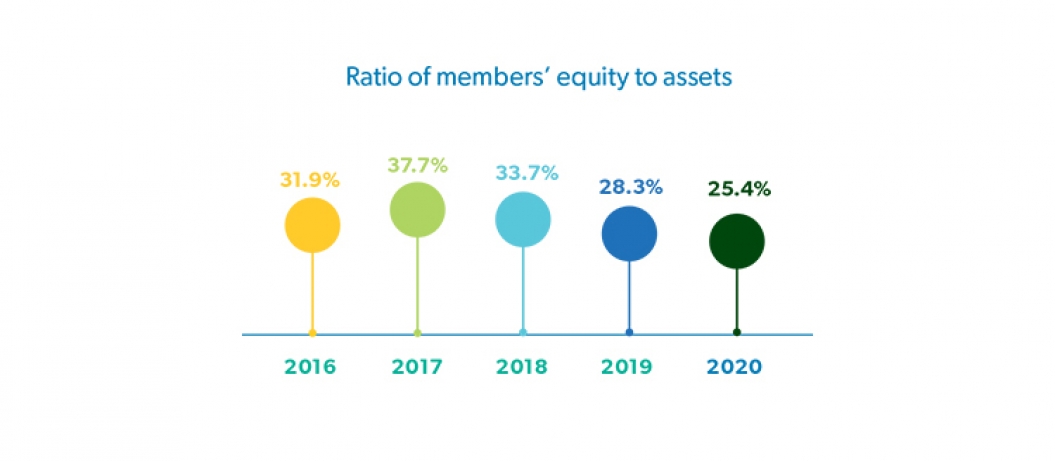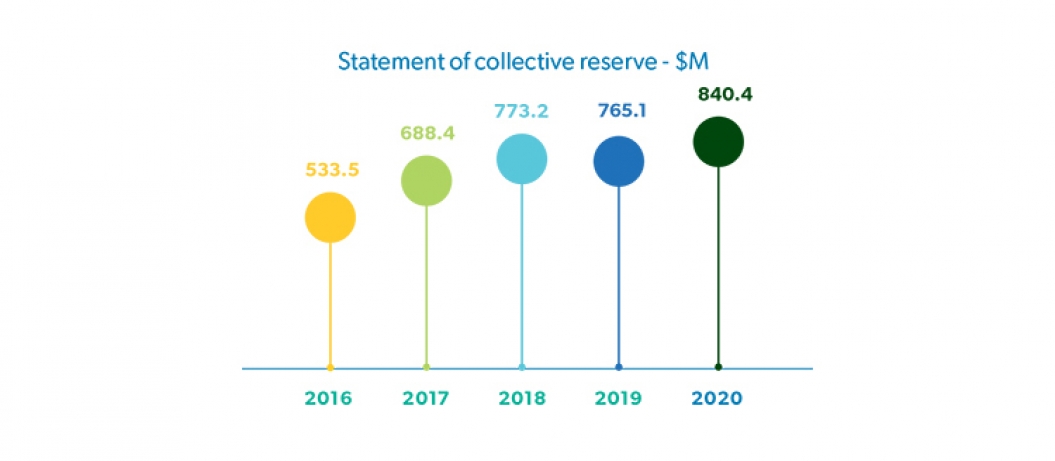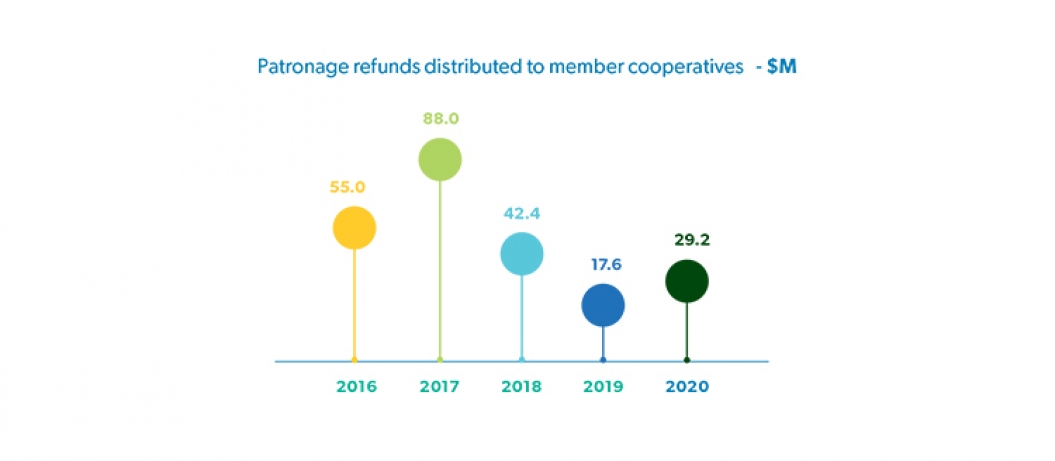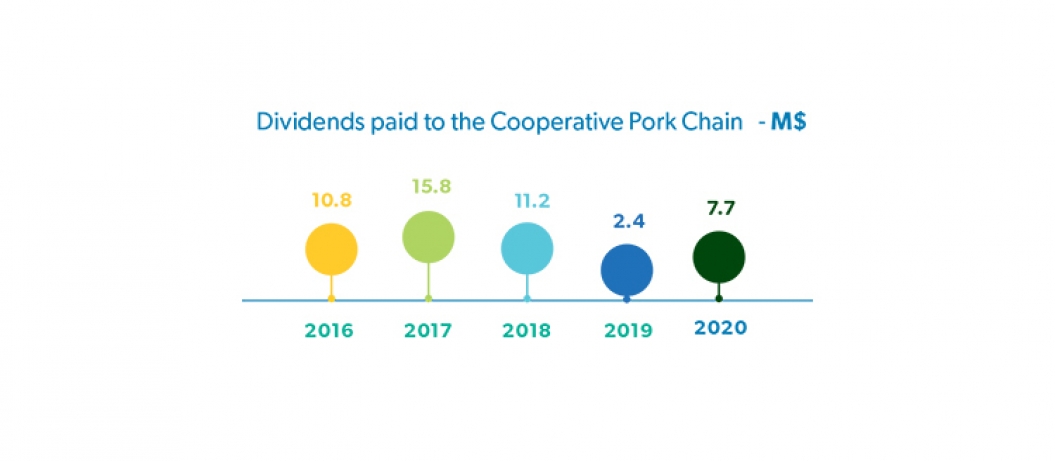In a year that will forever be remembered as one of the most tumultuous in the history of the modern economy, Sollio Cooperative Group continued to grow by surpassing $8 billion in sales. A performance that showcases the effectiveness and resiliency of our cooperative business model.
Sollio Cooperative Group generated $8.152 billion in sales and $201.0 million in earnings before patronage refunds and income taxes for the fiscal year ended October 31, 2020, compared with $7.282 billion and $79.4 million, respectively, for fiscal 2019. Growth was driven primarily by the Food Division (Olymel L.P.).
Our Food Division
For the Food Division, fiscal 2020 was highlighted by several important factors. Earnings before patronage refunds and income taxes totalled $234.1 million, up significantly from $72.3 million in fiscal 2019. The increase stemmed primarily from a recent acquisition in the Eastern fresh pork sector combined with higher meat margins in the fresh pork sectors.
The reopening of the Chinese market in 2020 and strong demand from China contributed to the increase in margins. Note that the strong demand from China for fresh pork rose following an outbreak of African swine fever that decimated a significant portion of the Chinese herd. Yet, the Food Division was badly affected by the COVID-19 pandemic, particularly with the temporary closure or slowdown in operations of certain plants, as well as the shutdown of the hotel, restaurant and institutional sectors, which have reduced the demand for processed products.
This extraordinary situation compounded by a railway blockade and strikes at the Port of Montréal and at one of the Division’s plants partly offset the significant results of the fresh pork sector. Nonetheless, the Food Division reported $613.3 million growth in sales, driven in particular by a completed acquisition, higher selling prices at the beginning of the fiscal year and greater volumes in the fresh pork sector. The increases were however partly offset by the negative impacts of COVID-19.
Our Agriculture Division
The Agriculture Division (Sollio Agriculture) reported earnings before patronage refunds and income taxes of $8.2 million, compared with $39.0 million in fiscal 2019.
The decrease resulted mainly from unfavourable results in the grains sector, which was affected by several factors. Firstly, the disappointing corn harvest in 2019 negatively impacted the trade balance by preventing exports in the spring of 2020. COVID-19 led to a significant drop in ethanol demand, resulting in lower demand for corn and significantly impacting the sector profitability.
Lastly, soybean marketing was badly affected by the geopolitical situation, with negative impacts on exports. That being said, the Agriculture Division’s external sales were up $45.0 million from last year, due primarily to a business acquisition made during the fiscal year.
From the beginning of the first wave of the COVID-19 pandemic in March, we took the actions required to ensure our shared priority of feeding our communities.
Our Retail Division
The Retail Division (BMR Group) posted earnings before taxes, including corporate expenses, of approximately $28.7 million, an improvement of 29.7 million over the last fiscal year. This result was driven largely by the $211.2 million increase in aggregate sales in fiscal 2020.
The lockdown and border closures following the COVID-19 pandemic affected Quebecers’ consumption habits, giving rise to attractive opportunities for the Division. These changes in habits translated into higher sales and margins.
The higher margins stemmed from increased prices for forest materials, influenced by the pandemic’s impacts. Lastly, the acquisition of a business operating in the distribution and marketing of construction materials in September 2019 made an additional significant contribution to sales and earnings.
Energy sector
Energy sector results are reported as a share of results of a joint arrangement owing to a 50% interest held via a subsidiary, Énergies SonGo inc. The share recorded for fiscal 2020 amounted to $13.9 million compared with $9.5 million in fiscal 2019.
Operating expenses
Cost of sales and selling and administrative expenses totalled $7.914 billion compared with $7.183 billion for the previous year. The increase was mainly attributable to the Food Division. Net financial expenses increased to $59.3 million in fiscal 2020 from $51.5 million for the previous fiscal year, owing primarily to the $287.0 million increase in the average long-term debt compared with fiscal 2019. Including the results of its divisions, Sollio Cooperative Group reported consolidated operating income of $178.8 million, compared with $48.1 million in fiscal 2019.
The other income and expenses included the share of results of joint arrangements, namely businesses in which Sollio Cooperative Group has joint control. This share totalled $50.7 million in fiscal 2020 compared with $34.9 million for fiscal 2019.
The increase was driven primarily by the Food Division’s animal production and processing sector following a significant loss recorded in 2019 and, to a lesser extent, the improved results attributable to the energy and crop production sectors.
The share of results of entities subject to significant influence – entities in which Sollio Cooperative Group has an investment of less than 50% – amounted to $4.7 million in 2020, compared with a loss of $2.5 million in 2019 that resulted primarily from the decision to discontinue the project to build an integrated urea and methanol plant. Investment income, which represents interest and dividend income from investments, totalled $3.1 million in fiscal 2020 compared with $2.2 million for the prior fiscal year.
Net losses on disposal and remeasurement of assets amounted to $1.2 million in fiscal 2020 compared with $3.3 million in fiscal 2019. The 2020 loss stemmed primarily from the sale of units held in subsidiaries and joint arrangements of the Agricultural Division, offset by gains on disposals of property, plant and equipment. The 2019 loss resulted from the remeasurement of a note receivable in the energy sector, partly offset by gains on the disposal of property, plant and equipment, particularly a gain from the sale of the building housing the head office and a gain on the acquisition of assets of an Agriculture Division business.
For the year ended October 31, 2020, after deducting $29.2 million in declared patronage refunds and $30.9 million in income taxes, the Group reported net earnings of $141.0 million compared with $48.6 million in fiscal 2019. Net earnings attributable to members of the Group and included in the reserve amounted to $117.7 million, compared with $38.4 million in fiscal 2019, while net earnings attributable to non-controlling interests totalled $23.3 million, compared with $10.2 million in fiscal 2019.
Our business model is clearly resilient as it relies on a robust culture of cooperation, collaboration and transparency.
In light of fiscal 2020 results, the Board of Directors resolved on January 18, 2021, to pay a $7.7 million dividend to holders of shares in the Cooperative Pork Chain.
Parent company
The parent company’s net expenses increased to $81.1 million from $9.0 million for the previous fiscal year, owing in part to the purchase of annuities for certain defined benefit pension plans combined with the unfavourable return on actuarial assets. In addition, a loss on remeasurement of interest rate swaps was recorded following a sharp drop in interest rates resulting from the COVID-19 pandemic.
Fiscal 2020 also saw investors confirming their trust in the organization. More than $450 million has been invested since October 2019 to finance acquisition projects and additions to property, plant and equipment. With these investments, we can accelerate our optimization project by promoting digitization and innovation, continue to position ourselves as a leader in the agri-food and retail sectors in both Québec and Canada, and mitigate the impacts of the COVID-19 pandemic on our growth plans.
A year of turbulence and resilience
Fiscal 2020 can be characterized as an exceptional year in terms of events, achievements and results. COVID-19 created great uncertainty not only for many of our members, our personnel, our organization, our divisions and our network of cooperatives but also across our business environment.
From the farm to the table, every link in the agri-food and retail supply chain was put under enormous pressure and we had to quickly adapt our ways of doing things to deal with the new reality. Our business model is clearly resilient as it relies on a robust culture of cooperation, collaboration and transparency, a sustainable value creation model, and meets growth objectives and future challenges with a long-term vision.
All of which greatly helps us to navigate through turbulent times. From the beginning of the first wave of the COVID-19 pandemic in March, we took the actions required to ensure our shared priority of feeding our communities by adapting to prevent and mitigate the pandemic’s impacts.
Leveraging our past experience and complying with public health guidelines, we adopted measures to keep our staff, clients and suppliers safe, and ensure business continuity. As a provider of essential services, we kept in mind our responsibility as a major player in the agri-food value chain.
Human resources
Human resources play a key role in Sollio Cooperative Group’s successes as eloquently demonstrated more than ever during the extraordinary year that just ended. As elsewhere, our ways of doing things were transformed overnight. By setting out a new vision of remote work, Sollio Cooperative Group has reinvented itself to better respond to employee needs and optimize the digital shift underway.
Talent and Culture project
In line with our new strategic plan, Echo vision and leadership, a development program for our leaders was launched in fall 2020. It brings together all the members of management committees of our divisions and those of the parent company. It’s a unique experience designed to foster cross-disciplinary collaboration to better understand our professional ecosystem and inspire reflection and action. This year again, Sollio Cooperative Group made the list of Montréal’s Top Employers. This competition, an initiative of Canada’s Top 100 Employers, recognizes the employers in Greater Montréal for their exceptional workplaces and practices.
Health and well-being
Overall health is a genuine concern for our employees. A financially, physically and psychologically healthy workforce provides remarkable benefits, in terms of both productivity and mobilization.
To that end, several actions were taken during the year, including telemedicine, production of mental health capsules for the entire network, development of an internal volunteer program and relaunch of the Employee Assistance Program. In terms of collaboration with the network, a complete overhaul of the Mutuelle de prévention's policies was carried out during the year.
Looking to the future
Sollio Cooperative Group is currently experiencing strong growth in its business, which creates great opportunities as well as numerous challenges. Growth gives rise to an essential need for consolidation to allow our organization to seamlessly integrate the investments made and generate maximum synergy. I would like to acknowledge the effort, ingenuity and cooperation of all those involved in developing our 2020-2025 strategic plan. We adopted an innovative approach by focusing on two axes, namely business and the federation, as well as nine strategic orientations.
The alignment of each division’s plans and the parent company’s umbrella role will promote coherent actions, optimizing their effectiveness and ultimately, the benefits to the entire Sollio Cooperative Group. Under Vision 2020, which will now be called Vision plus, our teams worked tirelessly to support cooperatives, particularly in managing and implementing projects, negotiating and drafting contracts, hiring senior executives and defining organizational structures, and providing consulting services in communications and branding development.
We are very proud of Vision 2020 since it will have laid the foundations for the modernization and transformation of the network business model, in response to market consolidation and member concerns. During the past fiscal year, we also made sure to respond adequately to our members’ request to play a more active role with respect to government authorities, our stakeholders and in the public arena. In addition to our From Us to You initiative, we carried out a communication campaign entitled Together, let’s set the table for tomorrow; introduced a new policy on donations and sponsorships; worked on the renewal of the tax-deferred share program; and submitted our economic recovery plan for the agri-food sector.
These initiatives help Sollio Cooperative Group to pursue its societal role and mission with greater focus. Lastly, our new name became a reality during the past year. Canada’s largest agricultural cooperative with deep roots in Québec took on a new identity that corresponds to its scope and ambition, strengthens our feeling of belonging and the cooperative model’s relevance. For Sollio Cooperative Group, its growth and expansion in the Canadian, U.S. and global markets is more than ever a priority. A new name. A new us.
To conclude, the Executive Committee and I would like to extend a thank you to all the members of the Board of Directors and the President Ghislain Gervais for their support and advice. We are grateful for your unwavering commitment and involvement during the past fiscal year. We wish to thank all the presidents and general managers of the affiliated cooperatives for their collaboration during this year full of upheavals. I am indebted to all of our organization’s personnel and Executive Committee members for meeting the challenges of the past year. I also thank the management teams of our divisions as well as all our employees for their commitment and dedication. Despite COVID-19, many of you served on the front line day after day to continue feeding the world and maintaining our essential services. I’m very grateful to you. In closing, I would like to congratulate Pascal Houle who, following a rigorous selection process, has been appointed as Chief Operating Officer of Sollio Cooperative Group.
This appointment, which stems from our senior management succession plan, demonstrates the talent and excellence within our organization. The CEOs of Sollio Agriculture and BMR Group will report directly to him. Mr. Houle takes up his duties the day after the Annual General Meeting.

